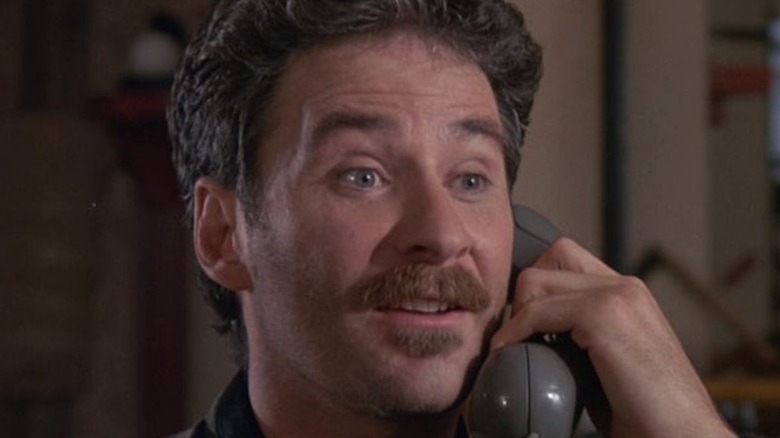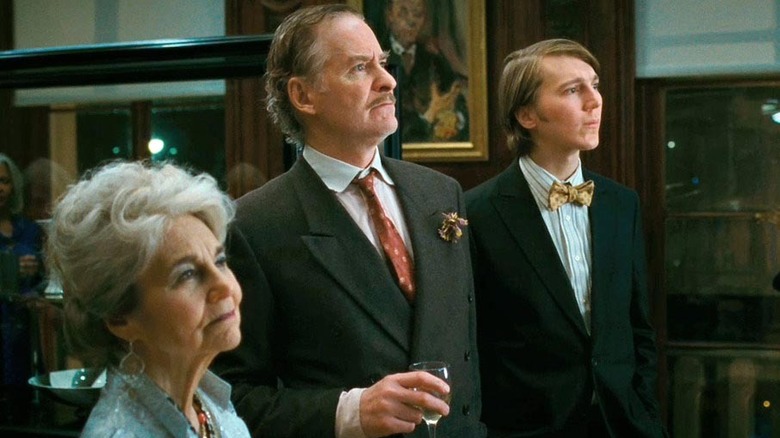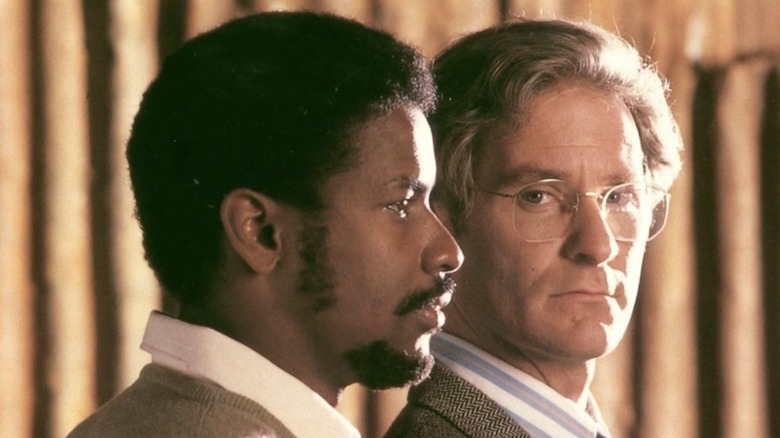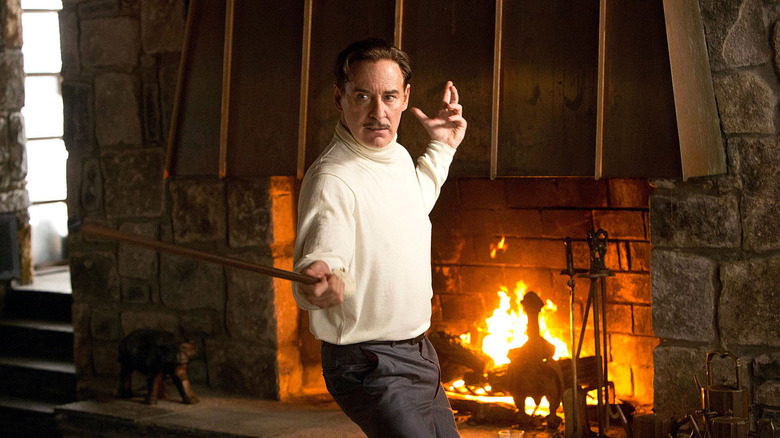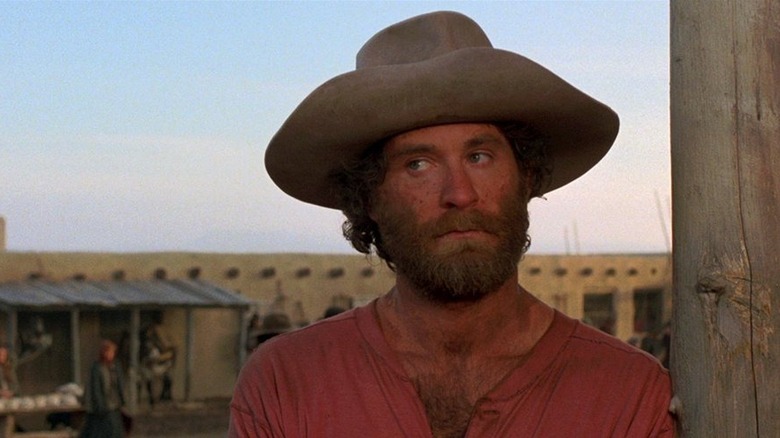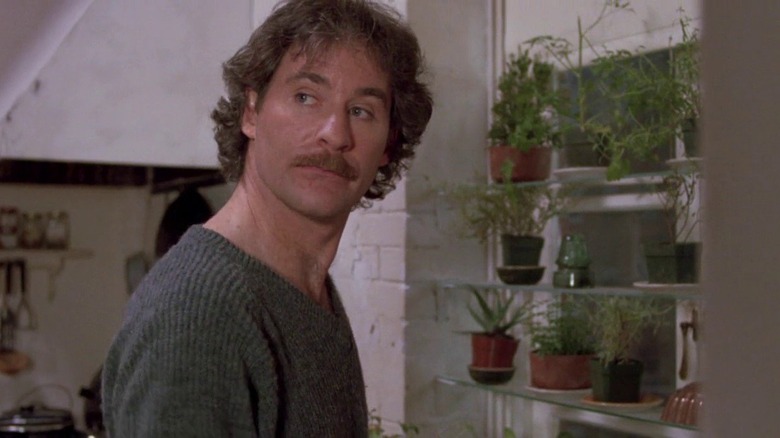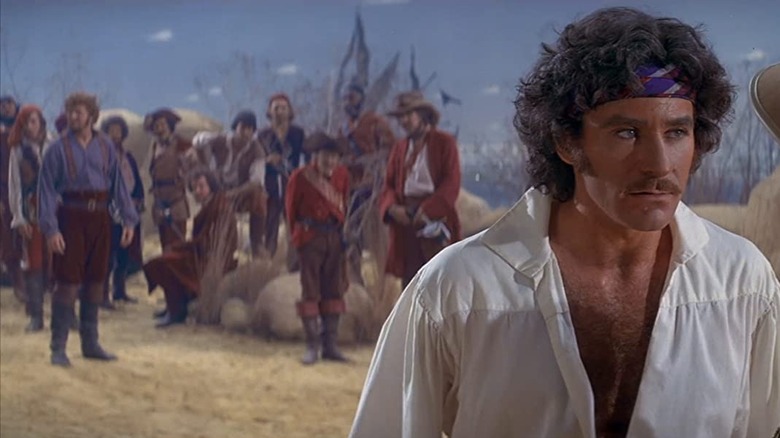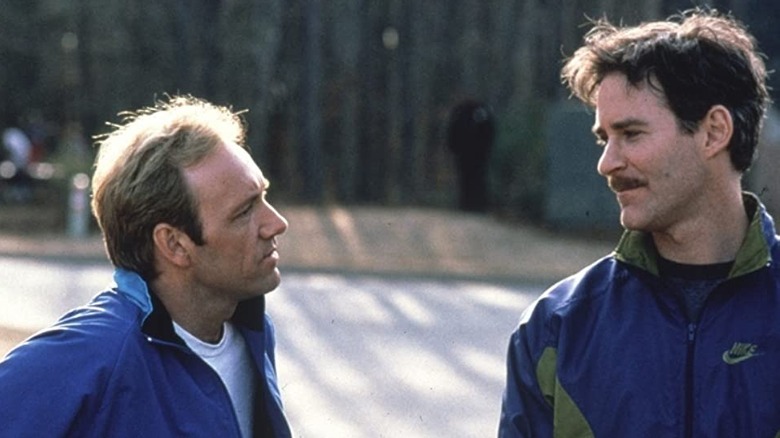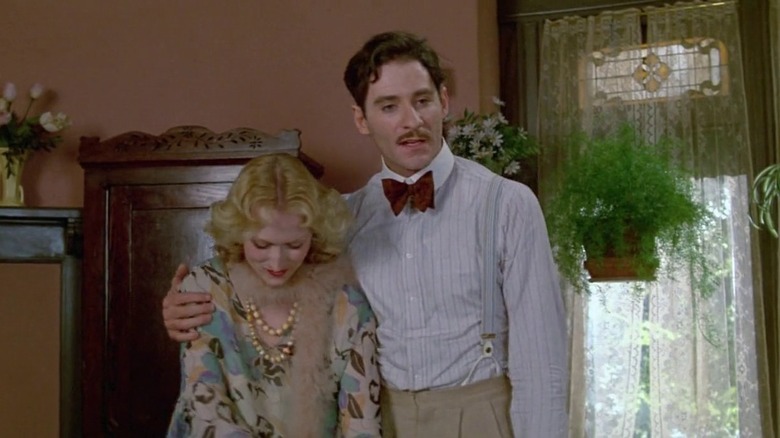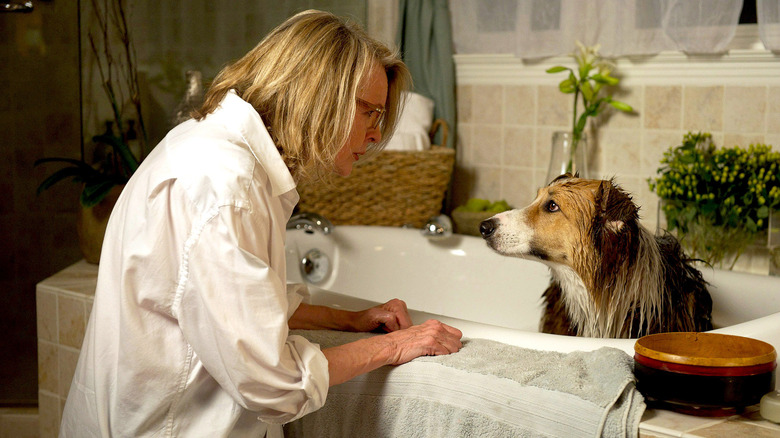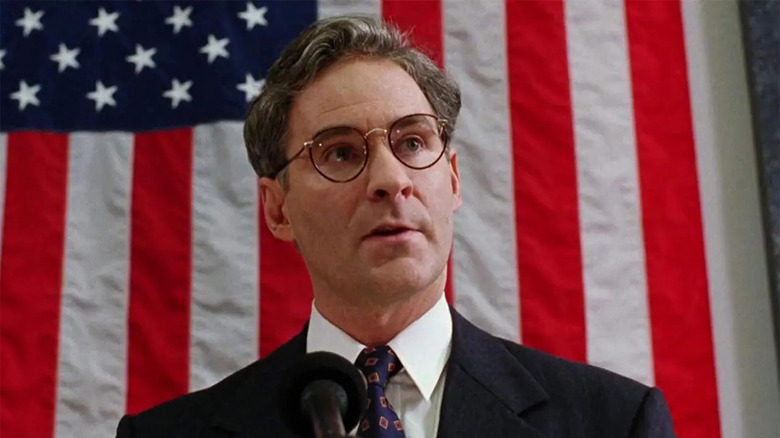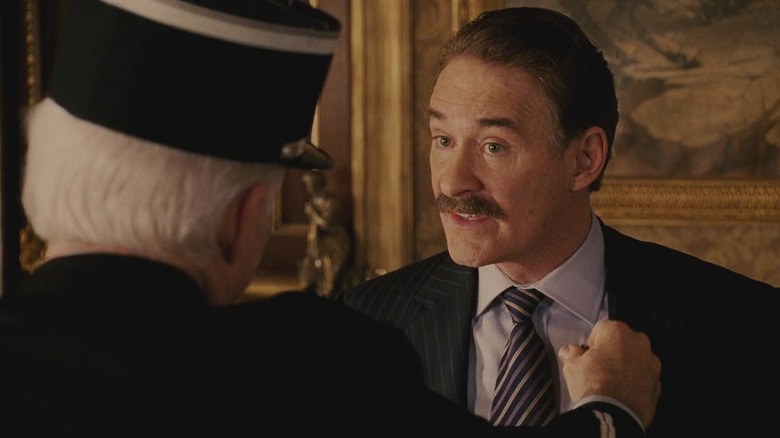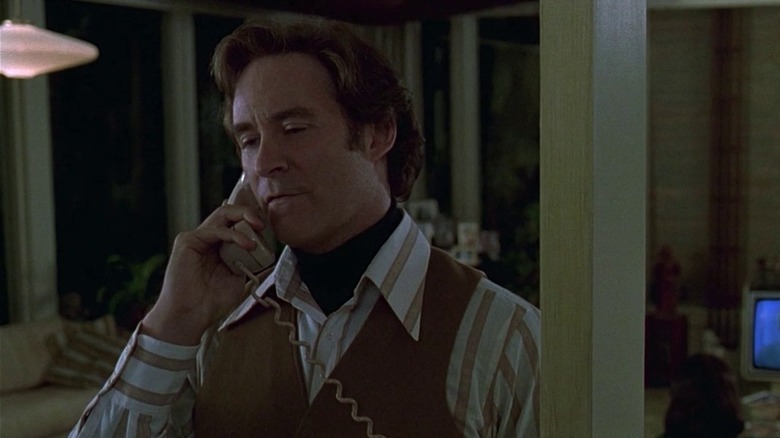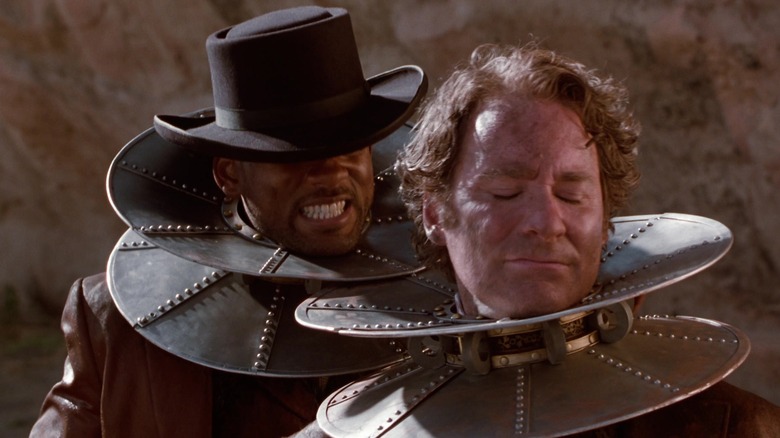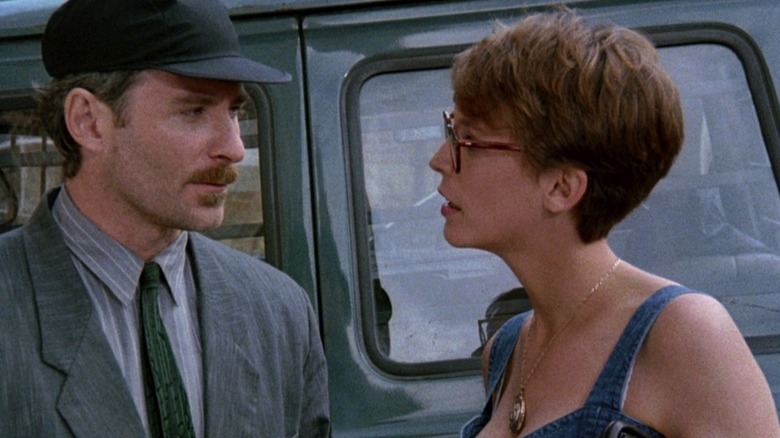Kevin Kline's 7 Best And 7 Worst Movies Ranked
Kevin Kline is one of those rare actors who could convincingly tackle any role that's given to him. From his initial cinematic debut in 1982, he's starred in emotionally taut romance films, feel-good ensemble movies, westerns, musicals, and comedic heist movies. As radically different as each of his movies are, Kline always consistently manages to dial his performances up to a perfect "10" time and time again. Over the past 40 years, Kline has left a lasting legacy on the film industry as a consistently impressive performer the likes of which are seen only so often. Though capable of handing in riotously humorous performances, he's also proven he can excel in more serious roles as well. For his character-rich portrayals, he's gained such coveted awards as the Academy Award for best supporting actor, three Tony Awards, and numerous nominations at the BAFTAs, Golden Globes, and Primetime Emmy Awards.
However, as is the case with any actor, Kline's filmography is not completely flawless, containing several underwhelming movies sprinkled throughout his career. In particular, the movies of Kline's later years usually fail to live up to the success of his earlier career, including the defining movies of the 1980s and '90s that made Kline a worldwide star in the first place. Here are some of the greatest films to feature the Oscar-winning Kline, as well as a handful of his worst movies to date.
Worst: The Extra Man (2010)
Kevin Kline has had a long and successful career playing a variety of eccentric characters, from the charismatic Pirate King in "The Pirates of Penzance" to the embittered anglophobe Otto in "A Fish Called Wanda." However, not all of these idiosyncratic performances have proven fruitful, with his starring role in "The Extra Man" clear evidence of this fact. Traveling to New York City to pursue his dream of writing, Louis (Paul Dano) moves in with a dashing roommate (Kline) who provides companionship to elderly women as a career. Agreeing to take Louis on as his protege, the older roommate teaches Louis everything he knows about the hidden art of being "an extra man."
"The Extra Man" is a prime example of Kline's acting abilities rising above a mediocre film. Transcending the limits of a weak script and poor direction, he plays his character with all the wit and fancy of an 18th-century dandy transported to modern New York. Still, such an elevated performance isn't enough to save this movie, which drew predominantly negative reviews. "For all its flighty charms, 'The Extra Man' never really lands. It hovers like a hummingbird madly beating its wings to stay aloft," said the New York Times' Stephen Holden.
Best: Cry Freedom (1987)
Kevin Kline has starred in his fair share of biopics over the years, but few are as gripping or emotionally stirring as "Cry Freedom." Set in the late 1970s, the movie takes place in politically divided South Africa during the height of apartheid. After Black activist Steve Biko (Denzel Washington) dies under mysterious circumstances, his liberal journalist friend Donald Woods (Kline) decides to write a book about him, meeting the antagonism of the corrupt South African police as a result.
Based on a true story, "Cry Freedom" was a critical success for everyone attached to the project. The film received Academy Award nominations for best supporting actor (Washington), best original score, and best original song ("Cry Freedom"). It was also nominated for best film among other accolades at the BAFTA Film Awards. "The performances are excellent, the crowd scenes astonishing, and the climax truly nerve-wracking. An implacable work of authority and compassion, 'Cry Freedom' is political cinema at its best," said Time Out. Some critics felt the movie could've gone further in probing the racial injustices of South Africa during its apartheid period, but "Cry Freedom" still does a great job examining the lives and influence of Biko and Woods. Washington may outshine Kline in most of their shared scenes, but Kline still excels at portraying a white man who becomes more and more aware of his country's wrongs, seeking to make a fundamental difference as his friend had previously.
Worst: The Last of Robin Hood (2013)
On the flip side of a high-caliber movie like "Cry Freedom," there's "The Last of Robin Hood," a 2013 biopic examining the relationship between Golden Age Hollywood actor Errol Flynn and up-and-coming starlet Beverly Aadland. In the late 1950s, a young girl (Dakota Fanning) who plans on becoming an actress moves to LA, where she encounters iconic actor Errol Flynn (Kevin Kline). Once one of the biggest celebrities in the film industry, the now middle-aged Flynn faces a career slump, although he agrees to take the young girl under his wing. Over time, their friendship soon blossoms into a romantic entanglement.
Kline soars high as the former "Robin Hood" star, his swashbuckling youth now long behind him, but the rest of the film sags when it tries to tackle too many weighty issues like the cost of celebrity status. If it had been more intrinsically tied to Flynn's life and career, it might've risen above the negative reception it garnered upon its release. Unfortunately, the film's wonderful actors aren't able to elevate the already weak script and direction. The Boston Globe's Ty Burr puts it more bluntly, writing, "'The Last of Robin Hood" plays like a laboratory control experiment gone wrong: What would happen if you made a movie with a great cast and terrible everything else?"
Best: Silverado (1985)
Kevin Kline reteamed with filmmaker Lawrence Kasdan, embarking on a film stylistically apart from the grounded realism of their 1983 hit "The Big Chill": "Silverado," a rip-roaring western starring Kline, Scott Glenn, Danny Glover, and Kevin Costner. On the frontier badlands of the Wild West, four men — each a social outcast for different reasons — band together to battle a small town's corrupt sheriff (Brian Dennehy) and his hired goons. While the film has shades of older '50s westerns in lieu of the more sophisticated revisionist westerns of the '60s and '70s, it was still generally well-received by critics. Rather than harkening too far back to the tone of the '50s, Kasdan still brings an element of sophistication to his story, creating a more engaging narrative for modern audiences. As The New York Times' Janet Maslin wrote, "'Silverado' is a sweeping, glorious-looking western that's at least a full generation removed from the classic films it brings to mind."
"Silverado" marked a very different kind of performance from Kline, one steeped in mystery and macho bravado that still maintained shades of his more comedic performances. As Paden — a lone cowboy with an enigmatic past — he's trying to run from his former life as a criminal and hired gun, forging a new existence for himself as a more respectable, law-abiding citizen with his own set of morals.
Worst: The January Man (1989)
Kevin Kline has conquered multiple genres in the past, from hard-edged neo-noir films to lighthearted comedic musicals. Looking back at his lengthy career, one genre the star failed to triumph over was the police procedural film, a genre he tried to take on with "The January Man." After a scandal that forced him to leave his post two years earlier, a brilliant detective (Kline) is reinstated as a police officer to stop a serial killer from running rampant in New York City. Aiding him along the way is the mayor's daughter (Mary Elizabeth Mastrantonio), whom the detective develops feelings towards, as well as the detective's neighbor (Alan Rickman).
Between Kline, Mastrantonio, Rickman, Susan Sarandon, Harvey Keitel, and Rod Steiger, there's no denying that "The January Man" has an unbelievably gifted cast at its disposal. How it manages to waste such immense talent in the finished film is beyond baffling. Trying and failing to blend comedy and crime, it has difficulty maintaining a cohesive tone. As a result, it comes across as a sloppy, poorly-paced mess of a movie, one which earned almost universally negative reviews. Influential critic Roger Ebert wrote of the film, "It's all over the map. It wants to be zany but violent, satirical but slapstick, romantic but cynical. It wants some of its actors to rant and rave like amateur tragedians, and others to reach for subtle nuances. And it wants all of these things to happen at the same time."
Best: The Pirates of Penzance (1983)
One of the more fascinating movies of Kevin Kline's career was his appearance in "The Pirates of Penzance." Released one year after his more dramatic screen debut, it is about as contrasting a film from "Sophie's Choice" as you can imagine. It is a brilliant and audacious modern take on Arthur Sullivan and W. S. Gilbert's famed opera of the same name. Coming of age in the 1850s, young Frederic (Rex Smith) was raised as the apprentice of the fearsome Pirate King (Kline) after an innocent mistake made by his elderly nurse (Angela Lansbury). Now grown, Frederic vows to leave his former companions behind and rid the seas of pirates once and for all.
"The Pirates of Penzance" saw most of the original cast from the 1980 Broadway run return for the film, all to dazzling effect. As brightly colored as a '50s Technicolor movie, it's almost a self-aware parody of classic Hollywood pirate films. Though a box office disaster, grossing a mere $694,497 (per Box Office Mojo), the movie performed remarkably well among critics. "The show is strewn with throwaway sight gags absent from the stage version which, while mercifully never quite sliding into camp, serve to apply a much-needed cattle prod to Messrs G & S," said Time Out. As the Pirate King, Kline seems to be channeling his inner Errol Flynn decades before his turn as the actor in "The Last of Robin Hood," with over-the-top mannerisms and speech to charming effect.
Worst: Consenting Adults (1992)
Kevin Kline's specialty may be comedic roles, but that doesn't mean he doesn't take on more serious characters as well. Some of these more sobering roles (such as his debut in "Sophie's Choice") are skillful in their own right, though every so often Kline will misstep in a movie that fails to capitalize on its promising plotline. Such can be said about 1992's neo-noir thriller "Consenting Adults." The Parkers (Kline and Mary Elizabeth Mastrantonio) are a normal couple who lead a peaceful, uneventful life in the suburbs. When the carefree Otises (Kevin Spacey and Rebecca Miller) move next door, the couples begin spending more and more time together until their friendship takes a sinister turn: Mr. Otis proposes to trade wives for the evening.
The first act of "Consenting Adults" is decent enough, presenting an off-beat story of a couple becoming entangled in their neighbors' lives to escape the boredom of their own marriage. The second act is a badly mangled mess of plot twists and frustrating character arcs for the sake of dramatic necessity. Even Kline himself hands in an underwhelming performance as the male lead, a thin cardboard cutout of a character whose only purpose is to look baffled at the transgressions of his neighbors. Entertainment Weekly's Owen Gleiberman wrote, "Sooner or later, someone had to make a trendy, erotic, dark-side-of-yuppie-life thriller in which the early, 'psychological' part ... manages to be every bit as stupid and predictable as the flat-footed finale."
Best: Sophie's Choice (1982)
Kevin Kline made his film debut with the romantic drama "Sophie's Choice," directed by Alan J. Pakula who would work with Kline later on "Consenting Adults." Having had a decade of experience working in theater, Kline arrived as a fully-formed talent. The film allowed him to gain the instant attention of moviegoers and Hollywood producers alike, almost certainly accounting for his career heights throughout the remainder of the '80s. In the late 1940s, aspiring writer Stingo (Peter MacNicol) moves to New York City, quickly becoming friends with his neighbors Nathan (Kline) and his Polish immigrant wife Sophie (Meryl Streep). The more Stingo gets to know the couple, though, the more he learns about their complex marriage, characterized by lies, jealousies, and abuse.
It takes an exceptional actor to match the onscreen presence of someone like Meryl Streep. In "Sophie's Choice," Kline proves himself an actor of radically high marks, breathing life into his endlessly complicated character. A favorable box office draw, raking in $30 million against its $9 million budget (via Box Office Mojo), "Sophie's Choice" was warmly received by critics. Roger Ebert said of the film, "the movie is so perfectly cast and well-imagined that it just takes over and happens to you. It's quite an experience." The movie was nominated for best adapted screenplay, best cinematography, best original score, and best costume design at the Academy Awards, with Streep winning the Oscar for Best Actress.
Worst: Darling Companion (2012)
Kevin Kline's later career has seen him taking on a larger amount of more lighthearted romantic comedy films. In most cases, these movies are a far cry from the career-making performances of his earlier films but are still generally decent enough to warrant a watch. The 2012 film "Darling Companion" is not one of those movies. It's an average, mechanically-paced, feel-good movie that bears little-to-any qualities that make it worth seeing at all. With no one to spend time with or pour her affection towards, a lonely woman (Diane Keaton) adopts a dog who she forms an extremely close bond with. When her emotionally distant husband (Kline) ends up losing the dog, the woman and her family launch an all-out search to find the missing canine.
Kline and director Lawrence Kasdan have collaborated on a few remarkable projects in the past, but "Darling Companion" certainly isn't one of them. Anchored too firmly in sentiment, the movie focuses heavily on the problems plaguing the heroine and her family. The only issue is that the problems aren't that interesting or thematic to watch. It's all too mundane to find entertaining, notwithstanding a few somewhat enjoyable performances by Keaton and Kline. "Even the marquee ensemble anchored by Diane Keaton, Dianne Wiest, Kevin Kline, and Richard Jenkins is not enough to rescue this motley mutt of a movie," said the Los Angeles Times' Betsey Sharkey.
Best: Dave (1993)
Like all the best comic actors, Kevin Kline is able to portray characters that are as full of heart as they are genuinely entertaining to watch. In "Dave" Kline perfectly demonstrates that keen ability, portraying not one but two completely different lead characters, each of whom possesses their own distinct personality and character quirks. Dave Kovic (Kline) is a mild-mannered temp agency executive approached by the Secret Service due to his uncanny resemblance to the President (also Kline). Hired to act as a body double for POTUS whenever the commander-in-chief wants to get away, Dave finds himself stuck in the role indefinitely after the President suffers a major stroke that leaves him in a coma.
The central premise for "Dave" may have all the makings of a dull role-swap comedy, but the movie's capable cast and the intelligent script allow it to go in unexpected directions. A financial success — grossing $63.2 million against its $28 million budget (via Box Office Mojo) — "Dave" also drew in an Academy Award nomination for best screenplay and a Golden Globe nomination for best actor (Kline). "When I first heard this storyline, I imagined that 'Dave' would be completely predictable. I was wrong ... Ivan Reitman's direction and Gary Ross' screenplay use intelligence and warmhearted sentiment to make 'Dave' into wonderful lighthearted entertainment," said Roger Ebert. Watching Kline in dual roles, you're aware that — despite their obvious physical similarities — each character feels unique from one another, a testament to Kline's profound onscreen abilities.
Worst: The Pink Panther (2006)
After a famous football coach (Jason Statham) is murdered and his priceless diamond stolen, Chief Inspector Dreyfus (Kevin Kline) assigns the hopelessly inept Inspector Jacques Clouseau (Steve Martin) to solve the murder and recover the jewel. Given how deeply loved and influential the original "Pink Panther" series was, the 2006 remake had an extremely tough act to follow. Unfortunately, the movie failed to live up to the high bar set by the Peter Sellers-led films of the '60s and '70s. The franchise's signature slapstick elements are all there, but Martin falls flat when it comes to measuring up to the comedic genius of Sellers' performance.
Despite being a commercial success, grossing $164.1 million against its $50 million budget (via Box Office Mojo), the movie earned almost entirely negative reviews from critics, garnering two Razzie Award nominations for worst remake or rip-off and worst supporting actress (Kristin Chenoweth). "There are moments that are funny in a mechanical way ... But at every moment in the movie, I was aware that Peter Sellers was Clouseau, and Steve Martin was not," said Roger Ebert. Kline himself is largely entertaining as the series' traditional straight man Dreyfus as Clouseau's superior finds himself increasingly addled by his underling's buffoonery. Much like the comparisons between Martin and Sellers, Kline ultimately pales in the shadow of Herbert Lom's performance as the cantankerous chief inspector. After all, it was the role that Lom made practically as iconic as Clouseau.
Best: The Ice Storm (1997)
Kevin Kline has built a rich filmography filled with a mixture of dramatic and comedic performances. Arguably his most emotionally engaging role came with 1997's "The Ice Storm," which saw the actor as part of an ensemble cast featuring Joan Allen, Tobey Maguire, Christina Ricci, Elijah Wood, and Sigourney Weaver. Over Thanksgiving weekend in 1973, two suburban families contend with a variety of issues threatening their private lives, including alcoholism, infidelity, and meaningless sexual liaisons. Directed by noted auteur Ang Lee, the film competed for the prestigious Palme d'Or at the Cannes Film Festival and performed very well among critics. The influential team of Roger Ebert and Gene Siskel named it one of the best films of 1997. "'The Ice Storm'... captures this place, this season, this garish and confusing moment in history, with surgical precision," said Newsweek's David Ansen.
As Ben Hood, Kline plays a far more misanthropic character than any he'd previously portrayed. Moody about his stagnating career and forever at odds with his wife Elena (Allen), he tries to grasp whatever cheap form of momentary happiness he can find, whether through alcohol or extramarital affairs. It's a dark role for such a comically inclined actor, but as with many of his other dramatic performances, Kline completely hits out of the park.
Worst: Wild Wild West (1999)
"Wild Wild West" has gained an almost mythical reputation as one of the worst movies ever made. A loose remake of the 1960s western sci-fi series "The Wild Wild West," it's also among the most notorious box office bombs in history. In a steampunk version of the Wild West, a quick-drawing Army Captain (Will Smith) and an inventive US Marshal (Kevin Kline) are assigned to stop a former Confederate general (Kenneth Branagh) from avenging the South's loss in the Civil War.
Grossing $222.1 million against its $170 million budget (via Box Office Mojo), "Wild Wild West" was nothing short of a financial disaster, drawing universally negative reviews. "'Wild Wild West' is a comedy dead zone. You stare in disbelief as scenes flop and die. The movie is all concept and no content; the elaborate special effects are like watching money burn on the screen," said Roger Ebert. On top of that, the movie was nominated in eight different categories at the Golden Raspberry Award, winning the Razzie for worst picture, worst original song ("Wild Wild West"), and worst director. In a rare career slip-up, Kline costars in the film as the brilliant inventor/lawman Artemus Gordon, a character so poorly written he practically withers away every time he's on screen. Kline is so hopelessly mismatched with Smith that the whole film collapses from its opening moments. By the time you reach its cartoonishly over-the-top conclusion, you're perfectly aware of why the movie is universally hated.
Best: A Fish Called Wanda (1988)
"A Fish Called Wanda" may not contain any of Kevin Kline's strengths as a dramatic actor, but it does boast the most memorable comedic performance of his entire career. In a movie that also features "Monty Python" members John Cleese and Michael Palin along with Jamie Lee Curtis at the height of her popularity, Kline remains the standout. Four criminals conspire to steal a massive cache of diamonds, but after successfully completing the heist each of the gang members tries to double-cross the others. Among its numerous accolades, the film won Kline the Academy Award for best actor and received Oscar nominations for best director and best original screenplay. It was also nominated for best picture at the Golden Globes, and received a total of eight nominations at the BAFTAs.
A modern classic of British cinema, critical appreciation of "A Fish Called Wanda" has only grown with time. "'A Fish Called Wanda' is one of the best-constructed, funniest, and most clever comedies to grace motion picture screens in recent years," said James Berardinelli of ReelViews. Years later, it was included on the British Film Institute and Empire magazine's lists of the 100 greatest British films. As Otto — the closest thing the movie has to the main antagonist — Kline excels in a performance so animated, he seems straight out of a '40s screwball comedy. Maintaining wondrous chemistry with his fellow leads, Kline hands in one of his best and most famous roles to date.
